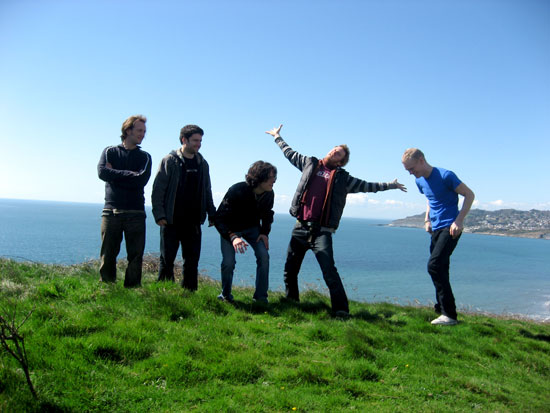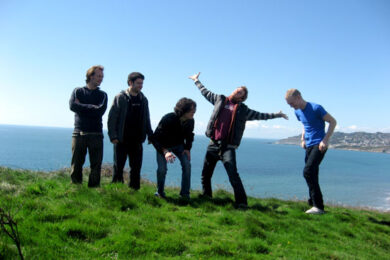Just how far down the line does post-rock have to go before it simply becomes, well, rock? The temptation to keep things formulaic – that’ll be quiet bits followed by an undulating increase of guitars before a visceral explosion of sound that eventually gives way to the next set of quiet bits which is then repeated to fade – is strong but by blending a number of influences, Leeds quintet Vessels are pointing the way forward.
Though the dissonant guitars remain firmly in place, Vessels add the kind of electronic jiggery-pokery that was once the sole preserve of Sheffield. Chuck in the infrequent use of vocals-as-instruments and, as became apparent with debut release, White Fields & Open Devices, Vessels are forging ahead with something new.
With Vessels set to embark on a 15-date UK tour, The Quietus got together with guitarist and occasional bassist Martin Teff to discuss recording in Minneapolis, friendship and the occasional punch up.
How did Vessels come about?
Martin Teff: "We were all kind of friends from around University in Leeds and eventually the four of us – me, Tim (Mitchell – drums), Tom (Evans – guitar, vocals) and Lee (J. Malcolm – guitar, vocals and laptop) – got together in 2002 and started writing songs under the name of A Day Left. We had another singer but it wasn’t really going anywhere and it really wasn’t that good so at that point we parted ways with our singer and wrote a whole bunch of new songs as a four-piece. Vessels came into life around 2005. Pete (Wright – guitar, vocals, keys and bass) joined the fold two years later. Ultimately, we’re a bunch of friends who like making music together.
Does it make a difference working with friends as opposed to complete strangers?
MT: "Oh yeah, totally! Music’s a form of communication and if you’re working with friends then it totally alters the sound and the way you interact within the band. It also makes things easier to resolve when there are differences within the band."
Have there been many creative tensions along the way?
MT: "Oh yeah, we’ve definitely had our fair share of those and the occasional fist fight but I must stress that they are fairly occasional. Particularly when you go on tour for long periods of time. Not that we tour for that long; you know, two or three weeks but by the end of that you could end up irritating somebody.
"I remember one tour where we’d been playing Dundee or somewhere like that and I’ve got a habit of not doing my fair share of the lifting. I was talking to the fella who ran the venue and he asked if we ever fought and I said, “No, we’re not that kind of band” and within a minute me and Lee were scrapping on the floor. That was quite an amusing turn of events."
Returning to the music, how would you describe Vessels to someone who’s never heard your music?
MT: "Well, usually I take one of two routes. If people like some of the stuff that we like, then I say that we sound like a cross between Mogwai and Battles with a bit of a pop edge like Broken Social Scene and a bit of electronica in there as well like Four Tet or stuff off Warp. For somebody who doesn’t have any of those reference points, then I’d probably say that we make kind of big, epic rock music with several drum kits and lots of guitars with vocals, keyboards, loud bits and quiet bits. Fairly epic and all over the place."
What draws Vessels to that kind of noise?
MT: "I guess it’s down to the things that we like listening to and experimenting with that and arriving at our own sound. You can break it down and know where it’s coming from but it’s definitely us."
You’re one of the few post-rock bands that sing.
MT: "Yeah, I suppose that’s true. We have had chats at various points about going totally instrumental but we’ve agreed that sometimes it’s good when people sing. And also, we use the vocals as if they were another instrument. Certainly, the way we try to use them they tend to blend in with the music. You know, if they sound good with the music then they stay in and if they don’t then the tracks stay instrumental."
You all play a variety of instruments in the band. Who chooses what to play and when?
MT: "It could just be how things turn out when we’re jamming out ideas and sometimes it could just be whatever someone picks up in the room. Or sometimes it could be that we need a keyboard part and the person to do that would be Pete so I’d then pick up the bass. Pete, Lee and Tom play a lot of instruments between them whereas me and Tim are good with electronics and guitars."
You worked on your debut album with Explosions In The Sky producer John Congleton. How did that come about and what were your objectives?
MT: "We were looking at our various options for recording and they ranged from doing stuff ourselves in the local studio or maybe approaching one or two people whose stuff we thought was OK. At some point I said to Tim, ‘Look, ideally who would we want to produce us?’ so Tim said why not use the bloke who did Explosions In The Sky and The Appleseed Cast. So we had a look around on the internet and sent him a message and we got a reply a few hours later saying, ‘I’d love to do your album’. We then spent ages working out where we were going to record it before finally settling on Minneapolis."
How did you find working out there?
MT: "It was brilliant, really fantastic. We arrived in a snowstorm and it stayed like that pretty much the whole time. The studio was in the middle of nowhere and when we arrived we got picked up the studio owner in like this massive home on wheels. And his first comment to us was, ‘Do you guys want any drugs?’ and we said, ‘Well, we’re British so, you know, we like a little bit of weed but that’s as dangerous as we get.’
"But the studio was brilliant with loads of old gear and an amazing drum room and beautiful scenery all round. I’m not sure that that impacted on the music much because most of it was already written by the time we got there but it’s really nice to be in the middle of nowhere and just focus on the music."
So what’s next for Vessels?
MT: "The last few months we’ve been working on new songs and we’ve got loads of ideas but we’re pretty anal so we take ages and ages writing songs. We’re trying to get some finished over the next couple of weeks, one of which should come out really, really nicely. Then we’ve got the April tour in the UK and then about a week to ten days in Europe. Hopefully some festivals this summer and then ideally get the album by the end if the year. But it takes time because we’re all anal and quite self-critical but we will be spending our time making sure that it’s better than our debut."



